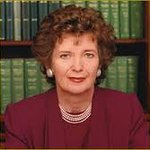The Elders today called on Zimbabwe’s political leaders and all figures in authority to commit to a truly inclusive national dialogue and prioritise the economic and social needs of ordinary citizens over party politics, factionalism and self-interest.
Mary Robinson, Chair of The Elders and former President of Ireland, and Graça Machel, Deputy Chair of The Elders and former Mozambican freedom fighter, visited Harare from 6-7 September. They met President Emmerson Mnangagwa for talks at State House, following on from their previous meeting in July 2018 with the late Kofi Annan, then Chair of The Elders.
They also met Nelson Chamisa, leader of the opposition MDC-Alliance party, and representatives of civil society, women’s groups, church leaders and representatives of the international community. They were particularly impressed with their conversations with women from across Zimbabwe convened in a dialogue platform by the Zimbabwe Council of Churches. This inclusive model offers a path for the whole country.
The Elders expressed their condolences on the passing of former President Robert Mugabe, whose death aged 95 was announced on 6 September. They urged all Zimbabweans to reclaim the spirit of optimism and dynamism that greeted Independence in 1980. This can only be done if the rule of law is upheld, human rights are respected, and the country’s abundant natural resources are distributed with accountability, transparency and equity.
Mary Robinson said:
“Last year I visited Zimbabwe on the cusp of landmark elections to find people determinedly optimistic about the future. Today that optimism has gone amid a worsening economic crisis, entrenched political polarisation and a culture of fear, paranoia and state violence. Yet I have been heartened by hearing from courageous women and church leaders from across society who are meeting to nurture dialogue and reimagine their country’s future. They offer an example that all Zimbabweans should follow.”
The Elders were alarmed to hear of the grave economic hardships endured across the country, which stand in stark contrast to the progress made in health and education in the early years of the country’s independence. They recognised the difficult economic reforms to bring currency stability and improve anti-corruption measures. They called on the government and international partners to act urgently to boost social protection measures and resilience-building programmes to empower local communities and stimulate growth. They also condemned the recent spate of abductions and cases of torture and sexual assault against peaceful demonstrators and civil society activists by police, security forces and unknown assailants. Such acts have no place in a democratic society, and there should be no impunity for those who commit these crimes.
Graça Machel said:
“Zimbabwe was once a beacon across Southern Africa in the struggle against colonial and racist oppression. It remains blessed with natural wealth and entrepreneurial, resilient citizens who deserve to live in dignity and prosperity. I am convinced that Zimbabwe can chart a path to a peaceful and democratic future, but only if a broad, inclusive national dialogue is given the space to flourish and resonate among all citizens.”
The Elders urged President Mnangagwa, Advocate Chamisa and all political leaders to find a way out of the current impasse and act constructively in the interests of the whole nation. Inflammatory language that perpetuates and exacerbates cycles of confrontation must be disavowed. All political and security forces must commit to abide by the Constitution of Zimbabwe, the rule of law, freedom of speech and the protection of human rights.
They also called on Zimbabwe’s neighbours in the Southern African Development Community (SADC) and the wider international community to hold its leaders to account in terms of their responsibility to their people. Economic and political reforms must progress in tandem to enable Zimbabwe’s reintegration into global markets and the community of nations.






